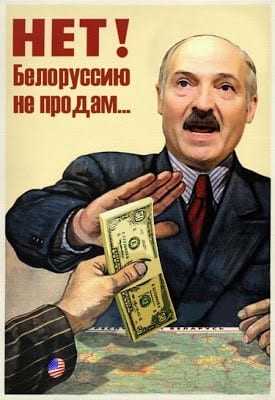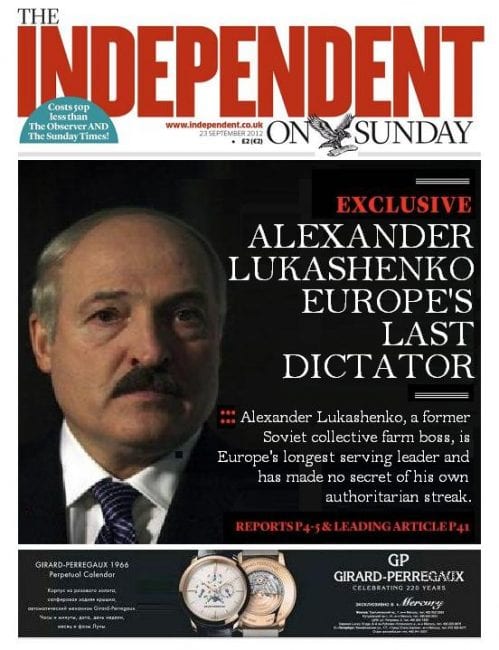ANDREW KORYBKO } SIMULPOST WITH RUSSIA INSIDER

Lukashenko shaking hands with Russia’s Medvedev. That was then. Now it would seem Lukashenko would be happier shaking Merkel’s or even Kerry’s hand. How naive can people get?
President Lukashenko’s willingness to depart from his so far successful balancing act between West and Russia, should be of concern to Moscow as:
- Belarus’ personality-driven system is vulnerable to flattery and direct diplomacyThe country is used by EU to evade Moscow’s legislation and illegally sell their goods on the Russian marketLukashenko is so adamant about bringing Washington to Minsk that he even wants to normalize relations with the USHe wants his country to prosper, but he also wishes to become internationally popular, and EU knows how to play to his ego
[dropcap]W[/dropcap]ill Belarus fall for short-term gain and lose Russia as its closest partner?
Belarus is backtracking on its commitment to Eurasian integration, since President Lukashenko is engaging in an unnecessary high-risk balancing act in order to legitimize his government in the eyes of the West.
The governing structure in the country is peculiar in the sense that it’s largely dependent on the whims of the man in charge, thus making it a personality-driven system that’s vulnerable to flattery and direct diplomacy. Belarus’ center-stage diplomatic role in hosting the Minsk Talks seems to have gotten to Lukashenko’s head , and the de-facto acceptance of his government by Germany and France (evidenced by Merkel and Hollande’s globally publicized visits to the country) may have made him think that he’s now “one of the club”, or perhaps, even a prestigious member.

Lukashenko with President Chavez. That was in the days when he polished his image as a man of the left.
Lukashenko has always tried to balance between the West and Russia while retaining a preference for the sovereignty that Moscow allows him in handling his country’s domestic affairs, but he may now be involving himself in matters above his head and beyond his control. It’s unknown whether he can continue to successfully enact his balancing policy under the overly intense pressures of the New Cold War, and it may be that the application of his old “balancing tricks” (milk and energy disputes with Russia, customs crises, strong “independent” political rhetoric, etc.) might cumulatively add up to create situations where he can’t extricate himself without dealing irreparable damage to his relations with Russia.
Here are Belarus’ latest moves and statements from Lukashenko that make one wonder whether he’s already made his choice in turning towards the West:
Complicity In Breaking The Counter-Sanctions
Belarus has been the base that counter-sanctioned EU countries have been using to evade Moscow’s legislation and illegally sell their goods on the Russian market. This breach of trust between close partners underscores the self-interested nature of the Belarusian leadership in advancing its own profit at the expense of its allies, thereby raising questions about its overall reliance in other commitments as well.
If the West ever offered Belarus a “better” economic deal than the one its already signed with Russia, would Lukashenko abandon his ally and take it, or would he remain as loyal to Russia as Syrian President Assad has been to Iran when the Gulf States offered him their own pipeline deal? After all, the Belarusian President spoke about the future possibility of leaving the Eurasian Union when the newly founded organization was only a couple of weeks old, demonstrating that he’s already weighing his options in the event that another opportunity more to his liking presents itself one day.
BELOW: Poster boasting of Lukashenko’s incorruptibility in the face of bribes.

The Francis Flip
Pope Francis played a primary role in brokering the Raul Castro-Obama deal on Cuba’s capitulation, and if he gets to mediate relations between Belarus and the EU, as the Vatican has recently offered to do, then a similar capitulation can also be expected.
Catholic Poland, whose compatriots comprise a very small but politically agitated minority in Belarus, has ambitions of restoring its hegemony over the lands of its former Commonwealth, and it aspires to use identity warfare and the support of the Vatican in bringing this about.
Warsaw already hosts the anti-government Belarussian House and other groups that are dedicated to regime change (of which Warsaw has directly been accused of conspiring to carry out), and in the interests of aggressive papal proselytization in historically Orthodox lands, it’ll doubtless team up with the Vatican in attempting to bring Belarus under its boots.
The intervention of Francis in trying to “improve” ties between the EU and Belarus is just soft power cover in giving Lukashenko a “face-saving” way to surrender if he so chooses.
Washington In Minsk
Some observers such as Daniel McAdams at the Ron Paul Institute of Peace and Prosperity believe that the key characteristic of the Minsk Talks was that the US wasn’t involved in the format, hence why it’s ultimately still in effect today (no matter how imperfect), but if one asked Lukashenko, he’d strongly disagree. He recently spoke favorably about the US possibly getting involved in the format, which would completely upset the diplomatic balance that’s been carefully constructed thus far.
In fact, Lukashenko is so adamant about bringing Washington to Minsk that he even wants to normalize relations with the US, which would lead to an expected influx of American diplomatic and NGO personnel that might be tempted to provoke a repeat of the Ukrainian scenario if Belarus ever stepped out of line afterwards.
It would also create an oddly uncomfortable situation if Belarus, Russia’s CSTO and Eurasian Union partner, gained a clean slate of pristine relations with the US at the same time that Moscow and Washington are battling it out in the New Cold War. Such an occurrence would surely raise concern in the corridors of the Duma and lead to a lot of second-guessing about Belarus’ geopolitical loyalty.
Rethinking The Belarussian-EU Relationship
The Belarusian Foreign Minister was quoted at the beginning of this month speaking about the necessity of normalizing relations with the EU, and considering the inroads that both sides have made with one another over the past year, such a move can’t be discounted.
As with the criticism of Lukashenko’s suggestion that the same be made with the US, it would be inappropriate for Belarus to normalize ties with the EU while its Russian ally (if it can even be called so at that point) is engaged in New Cold War struggle with Brussels, including a sanctions war that Minsk has repeatedly undermined for its own profit.
Lukashenko’s initiative to simultaneously move closer to the US and EU at the height of their asymmetrical hostilities against Russia portends negatively for its faithfulness to Moscow-led Eurasian integration processes.
***
Win-Win Or Win-Lose?
[dropcap]M[/dropcap]insk is under the false impression that siding with the West in the New Cold War against Russia might be a win-win scenario considering the benefits that are being dangled in front of them, however, this is actually a carefully crafted misperception designed to entice and mislead Belarusian leaders into making a major mistake.
While the short-term ‘benefits’ may appear to be shared, the only long-term beneficiary would be the West, which would gain valuable geostrategic advantages from its unwitting Belarusian benefactor.

Belarus has a very stable national economy (especially when compared to its European counterparts), thus making it an ideal partner in any economic arrangement, ergo why the EU is interested in it. Lukashenko doesn’t simply want his country to prosper, he also wants to become internationally popular as a result, and since Brussels has been courting his ego lately, he’s becoming more amenable to their influence.
Another thing on Lukashenko’s European “wish list” is to receive “regime reinforcement” (the opposite of regime change), in that his government is finally recognized all throughout the continent as democratic and legitimate (which it is) and no longer as the “last dictatorship in Europe”, the notorious American listing which struck straight through his inflated ego. (See image above.)
He enjoys a high level of real popular support among his people, hence why the media stereotype of a Color Revolution (i.e. “a popular uprising”) is impossible, but Belarus is still vulnerable to Color Revolution 2.0 tactics such as those unveiled in Ukraine.
If he doesn’t throw his lot in with the West, he’s afraid that violent street thugs (some of which could even be infiltrated in from Poland and Ukraine) will descend on Minsk the next time there’s an election and attempt to turn the capital into Kiev.
Unbeknownst to him, the West will still apply this tactic whether he’s friendly with them or not, as it’s nothing more than a simple tool to them in pressuring second-rate leaders to do their bidding, which is exactly what Lukashenko would become if tries to join their bloc.
Another factor that must be mentioned here is Lukashenko’s personal psychology, since the individual-centric nature of Belarus’ current political system makes this among the most important variables in considering the possibility of an anti-Russian pivot. The Belarusian leader initially had a superiority complex vis-à-vis Russia during the 1990s, when his country was largely spared from the economic and social turmoil over the early post-Soviet period mostly due to his own personal policies.
In negotiating the Union State of Russia and Belarus, Lukashenko thought that he could overpower Yeltsin in the proposed arrangement and essentially go from being the leader of Belarus to the leader of all of Russia.
The arrival of President Putin on the scene changed all of that, and Lukashenko then acquired an inferiority complex towards Russia and its leader.
Simultaneously, he also harbors a deep-seated inferiority complex against the EU that he’s had since he first came to power, and the combination of two such identical complexes against his two primary neighbors explains his sometimes schizophrenic and unjustified “balancing acts”.
Given his unstable psychological setup, he’s prime for any personal grooming that makes him feel acknowledged, respected, and powerful, which is exactly what the EU is currently doing, and therefore increasing the possibility that he may fully pivot towards them and against Russia.
[box] A. Korybko is a geostrategist based in Moscow. His analyses appear on Sputnik News and Oriental Review. [/box]
[printfriendly]
Remember: All captions and pullquotes are furnished by the editors, NOT the author(s).



This article makes factual errors and misses key fundamental points. It talks of the “psychology” of Lukashenko, but fails to mention that Belarus is far better off because it is the only country of the former USSR that continues to have a planned socialist economy. Fore instance the article states: “The Belarusian leader [Lukashenko] initially had a superiority complex vis-à-vis Russia during the 1990s, when his country was largely spared from the economic and social turmoil over the early post-Soviet period mostly due to his own personal policies.” The reason why Belarus was far better off was because Belarus maintained… Read more »
I agree with Mr Argue’s objections to this article, but my only critique of his position is that I am afraid he is looking at the situation obtaining in both Belarus and Cuba in too much of a static way. History does not accept such frameworks because all history is fluid, composed of abundant immanence. True, Belarus is one of the few nations to still preserve a significant socialist imprint, but the question is in what direction is it moving, or, rather, what direction is it likely to move now that Lukashenko is showing definite signs of being interested in… Read more »